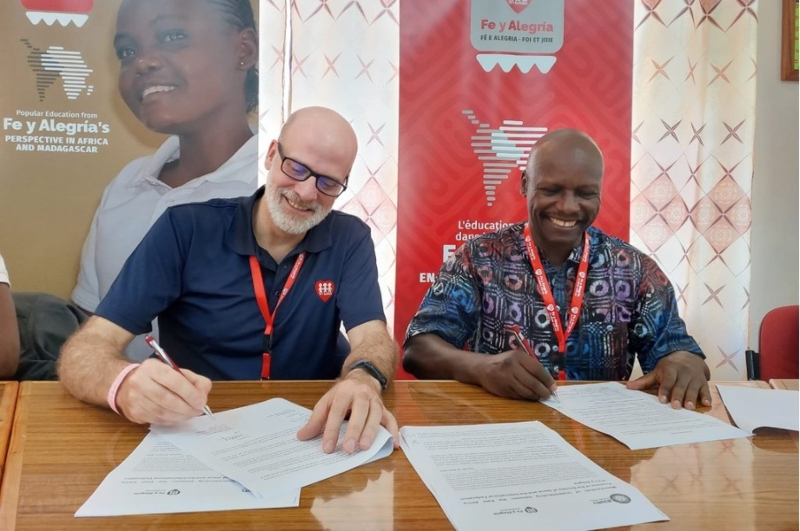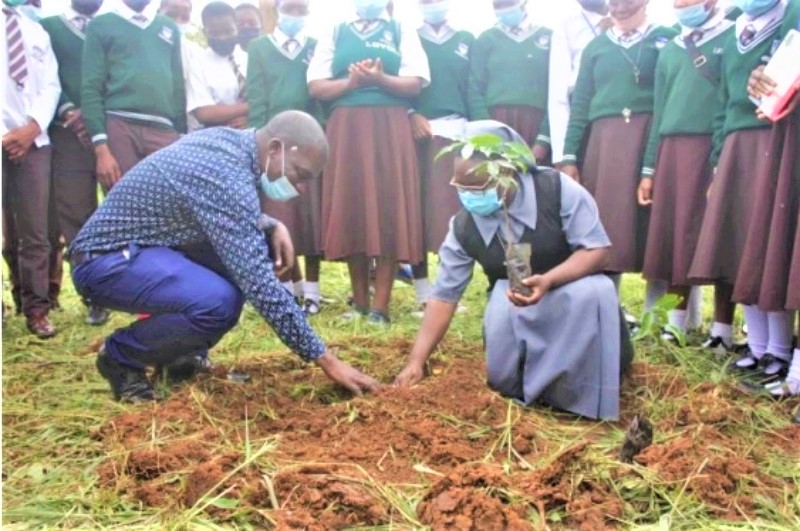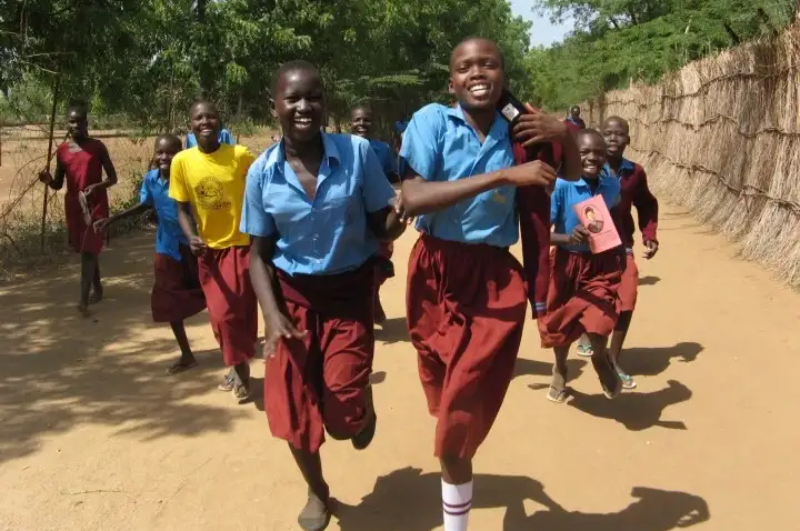




JASBEAM 2024 began with a focus on advancing education in Africa and Madagascar through a commitment to promoting quality education, collaboration, and networking.
The recent JASBEAM (Jesuit Africa and Madagascar Education Delegates Meeting) conference held in Antananarivo brought together key figures from Jesuit educational institutions across Africa and Madagascar to discuss strategies and share insights on improving education in the region. The event, hosted at the Maison Berthieu-Beyzym, in Antananarivo, Madagascar – featured significant contributions from various delegates, emphasizing the importance of networking, collaboration, and quality education.
Key Attendees
The meeting was attended by Fr. José Minaku Lukoli, SJ, JCAM President; Fr. José Alberto Mesa, SJ, Society of Jesus Secretary for Education; Br. Jonah Osaretin, SJ, Africa North-West Province education delegate; Fr. Andrianaivosoa Herizafiniaina, SJ, Madagascar Province education delegate; Fr. Augustin Kalubi, SJ, Central Africa education delegate; Fr. Bertrand Djimoguinan, SJ, West Africa Province education delegate; Fr. Buberwa Karongo, SJ, Eastern Africa Province education delegate; Fr. Christophe Alfred Rakotozafimahery, SJ, Rector of St. Michel, Antananarivo; Fr. Emile Nsengimana, SJ, representing Rwanda-Burundi region; Fr. Etienne Mborong, SJ, Global Ignatian Advocacy Network for Education in Africa and Madagascar (GIAN); Fr. Louis de Gonzague Razafindrazanaka, SJ, Rector of Collège Immaculée Conception (CIC Mananjary); Fr. Martin Kamau, SJ, Headmaster of Loyola High School, Dar-es-Salaam; Fr. Patric Razafimahafaly, SJ, Madagascar Province representative; Ms. Josiane Raharimalala, Teacher at CIC Mananjary; Ms. Lucy Monari, JCAM Safeguarding Coordinator; Ms. Sharon Oduor, JASBEAM Secretary; and Sc. Gabriel Losambe, SJ, Educate Magis.
Opening Ceremony
The conference commenced on April 25th with an opening prayer led by Ms. Josiane Raharimalala. Fr. Augustin Kalubi, serving as the coordinator in the absence of Fr. Joe Arimoso, welcomed participants and acknowledged the presence of the host Provincial, Fr. Jocelyn Rabeson, SJ, JCAM President Fr. José Minaku, SJ, and the Society of Jesus Secretary for Education, Fr. José Mesa, SJ.
The JASBEAM 2024 conference officially commenced in Antananarivo with a series of inspiring addresses from key figures in Jesuit education. The event, held at the Maison Berthieu-Beyzym, brought together educational delegates from across Africa and Madagascar to collaborate and share insights.
Opening Remarks by Fr. Jocelyn Rabeson, SJ
Fr. Jocelyn Rabeson, the host Provincial, opened the meeting by expressing heartfelt gratitude to the attendees. He acknowledged the difficulties many faced in traveling from various parts of the region, commending their dedication to the cause of education. Fr. Jocelyn drew a parallel to the daily challenges faced by children in Madagascar who strive to attend school despite significant obstacles.Highlighting the Jesuits' efforts to provide quality education, Fr. Jocelyn described the establishment of church schools in rural areas. These schools serve dual purposes, functioning as educational institutions during the week and as churches on weekends. He pointed out the notable absence of boarding schools in Madagascar, underscoring the need for such facilities to enhance educational access. Fr. Jocelyn emphasized that, despite diverse contexts, Jesuit schools in Africa and Madagascar share a unified mission to instill core Jesuit values in their students. He noted that the conference was an opportunity to exchange ideas and address common challenges, particularly those posed by poverty and political instability in Madagascar. He concluded by wishing everyone an enjoyable and productive stay in Madagascar, marking the official opening of JASBEAM 2024.
Address by JCAM President Fr. José Minaku, SJ
Following Fr. Jocelyn, JCAM President Fr. José Minaku, SJ, addressed the delegates, expressing gratitude for their participation and acknowledging the efforts of the organizing team, including the Society of Jesus Secretary for Education, Fr. José Mesa, and host Provincial, Fr. Jocelyn. He extended a warm thank you to the Malagasy Province for their hospitality. Fr. Minaku posed a critical question to the attendees: "What can we expect from this meeting?" He encouraged them to reflect on the current educational challenges and the vision they are nurturing for the future. Stressing the importance of growth through networking, he identified networking as a current weakness within JASBEAM and called for immediate action to strengthen these connections. He urged the delegates to incorporate the Universal Apostolic Preferences into their schools, emphasizing themes such as promoting discernment and the Spiritual Exercises, walking with the excluded, caring for our common home, and journeying with youth. Additionally, he highlighted the significance of introducing a culture of safeguarding in schools, supported by Ms. Lucy Monari's efforts. He concluded his address with a reassuring promise of support, emphasizing the necessity of understanding the JASBEAM context to facilitate effective networking. "We are a network, and we must work together to make networking possible," he said, underlining the inconceivability of having over 54 schools working in isolation.
The opening speeches set a collaborative and forward-looking tone for the conference, focusing on the collective mission to enhance Jesuit education across Africa and Madagascar.
Below is a report on the entire proceedings of the meeting.
State of Jesuit Education: Insights from the ICAJE Network
The International Commission on the Apostolate of Jesuit Education (ICAJE) oversees a diverse network of schools across the global Conferences of the Society of Jesus. The roots of Jesuit education trace back to 1548 with the founding of the first Jesuit school in Messina. Despite a decrease in the number of Jesuits, particularly in the global north, the number of Jesuit schools has continued to grow.
Key Discussion Points from the May 2023 Congregation of Procurators
During the May 2023 congregation, several critical questions were raised regarding the future direction of Jesuit education:
• Where is the spirit leading us?
• Where is the Lord working?
The reports indicated strong support for maintaining Jesuit schools, despite the reduction in Jesuit personnel. This shift is seen as a divine call to deepen collaboration with laypeople, ensuring that schools remain operational and aligned with Jesuit values.
Main Highlights
1. Growing Lay Collaboration and Mission Deepening
• The trend of increasing lay collaboration within Jesuit schools was highlighted. It is crucial to appoint qualified and competent lay individuals as headmasters or school leaders to ensure the continuity and integrity of the Jesuit educational mission.
2. Networking
• Networking among Jesuit schools at local, regional, and global levels is flourishing, facilitated by platforms like Educate Magis. However, it was noted that some schools still operate in isolation, underscoring the need for improved connectivity.
3. Formation for Educators
• Training educators remains a priority to preserve the Jesuit mission and identity. Regular training sessions for new educators are essential to ensure that Jesuit education principles are effectively taught and upheld.
4. Educating for Justice and Quality Education for the Poor
• The congregation emphasized the need to include the middle class in Jesuit education. Currently, Jesuit schools predominantly serve the rich and the poor, but expanding outreach to the middle class is necessary.
5. Universal Apostolic Preferences (UAPs)
• The fourth UAP concerning ecology is not merely about recycling but about a fundamental shift in thinking, approaching reality, and acting sustainably.
6. Faith Formation
• In a multi-religious world, Jesuit schools must foster open conversations about faith, with a significant dialogue expected in the upcoming Jogjakarta meeting.
7. Vocations
• The congregation raised concerns about promoting vocations within Jesuit schools, noting that more efforts are needed in this area.
8. Promoting a Consistent Culture of Safeguarding (PCCP).
• Proactive safeguarding measures are crucial to create a safe and nurturing environment for students, reinforcing that Jesuit education is a matter of the heart.
9. Pandemic Impact
• The COVID-19 pandemic has heightened parental appreciation for Jesuit education values. The challenge lies in integrating lessons learned during the pandemic into the evolving educational landscape.
10. Cura Personalis
• Ensuring that both students and educators experience Cura Personalis (personal care) is a priority. Educators must embody this principle to effectively impart it to students.
Concerns and Challenges
• Limited pastoral and faith formation activities in some schools, with a predominant focus on academics.
• In some instances, the apostolic dimension of schools is unclear, leading to an NGO-like mentality.
• Questions about the optimal number of schools: Should some be closed, and others opened?
• Debates on whether schools can serve as true apostolic platforms or if better alternatives exist.
• Insufficient emphasis on promoting vocations within Jesuit schools.
The ICAJE network is committed to addressing these concerns and leveraging opportunities to strengthen Jesuit education worldwide. By enhancing lay collaboration, improving networking, and focusing on holistic educator formation, Jesuit schools aim to continue their mission of providing quality education rooted in Jesuit values and adapting to contemporary challenges.
Promotion of a Consistent Culture of Protection (PCCP)
The Promotion of a Consistent Culture of Protection (PCCP) project, initiated by the General Congregation 36, began in 2016, was officially launched in 2019, and aims to eliminate abuses within and outside the church. The project is distinctive due to its social impact orientation, dialogic approach engaging diverse voices, and integration of Ignatian perspectives with scientific research.
Key Features of the PCCP Program
What makes the PCCP project unique?
• It is oriented to social impact: The goal is to contribute to help eliminate abuses inside and outside the church.
• Dialogic approach: It is a programme to and with people rather than at people. Processes which engage diversity of voices.
• Integrate the Ignatian perspective based on scientific research.
The three courses that will be provided include:
1. Safeguarding from an Ignatian perspective. This will be the pilot course and will be launched on May 15th, 2024. It will take an average of 15-20 hours. It will revolve around theology and the science of abuse prevention to protect all in our schools.
2. Successful Actions in Safeguarding 1 (Concrete application).
3. Successful Actions in Safeguarding 2 (Concrete application).
Further application of safeguarding practices
The courses will be localized for broader accessibility and detailed information will be available on the PCCP website. The pilot phase will be conducted at Loyola Jesuit College (LJC) in Abuja, Nigeria, and Loyola High School in Wau, South Sudan.
GIAN-Education Advocacy Plan for AfricAma: A Commitment to Education at the Margins
Fr. Etienne Mborong, during his presentation, emphasized the importance of advocacy, networking, and global engagement. He acknowledged the challenges faced by GIAN (Global Ignatian Advocacy Network) during its implementation. GIAN encompasses four critical networks: GIAN Ecology, GIAN Justice in Mining, GIAN Migration, and GIAN Right to Education. These networks work to amplify the voices of the poor and vulnerable.
JEMA: Jesuit Education at the Margins of Africa and Madagascar
Jesuit Education at the Margins of Africa and Madagascar (JEMA) is a network dedicated to providing quality education to the most marginalized communities in Africa and Madagascar. JEMA schools aim to create educational communities that connect students with their local environments. The educational methodology focuses on fundamentally transforming students’ lives, empowering them to become agents of change within their families and, ultimately, driving social transformation.
Challenges of Education in Africa Today
Fr. Etienne underscored several critical challenges confronting education across Africa. These include inadequate curricula, where many countries struggle with outdated and insufficient educational programs. Additionally, there is a concerning lack of student engagement, with students often displaying little interest in current educational offerings. Moreover, the issue of unemployment among graduates exacerbates community challenges, highlighting the need for improved job opportunities. Fr. Etienne also emphasized the necessity for better teacher training and ongoing support to enhance educational quality. Furthermore, the lack of access to facilities, such as equipped classrooms and necessary resources, presents a significant obstacle. Moreover, there is a notable gap in technological literacy, particularly in areas related to artificial intelligence, technology, and computer literacy education. Innovation and capacity-building programs for students are also lacking, hampering their entrepreneurial prospects. Lastly, youth delinquency remains a prevalent concern, with high rates of crime and drug use among young people posing additional challenges to the education system.
JEMA’s Vision
JEMA is committed to walking with the poor and the outcasts of society, those whose dignity has been compromised, in a mission of reconciliation and justice.
JEMA’s Mission
JEMA’s mission is multi-faceted:
• Universal Access: Ensure that all students have access to quality education.
• Sustainable Development: Promote educational practices that support sustainable development.
• Technological Inclusion: Guarantee access to quality technological and digital knowledge.
• Job Creation: Foster education that leads to employment opportunities.
• Funding for Education: Secure public funds to support educational initiatives.
• Citizenship: Develop programs that form better, more responsible citizens.
• Emergency Education: Provide quality education in emergency situations.
• Gender Inclusion: Ensure that education is inclusive of all genders.
JEMA’s dedication to these goals reflects a profound commitment to transforming education for the most marginalized communities in Africa and Madagascar, striving to create lasting, positive change.
II Seminar JESEDU-Jogja2024
The II Seminar JESEDU-Jogja2024, themed "Educating for Faith in the 21st Century," is scheduled to convene at St. John De Britto College in Yogyakarta, Indonesia, from June 24th to 28th,
2024. This significant event will be live-streamed on YouTube, expecting a participation of over one hundred attendees.
Pre-Seminar Activities: Ahead of the main event, a virtual pre-seminar has been ongoing from April 1st to 30th, 2024. This preliminary phase aims to engage participants and lay the foundation for the forthcoming discussions.
Objectives of the Seminar: The seminar is designed to achieve several crucial objectives. These include clarifying the role of Catholic and Jesuit schools in serving the Gospel and the Church in contemporary contexts, promoting in-depth faith formation through interreligious and multi-conventional dialogue, defining the place of Ignatian Spirituality in the faith formation process for students and educators, and identifying the challenges and opportunities of educating for faith in secular environments.
Types of Schools in Focus: The seminar will delve into different models of schools, each with its distinctive approach to faith and education. These include the Monologue School, representing traditional Catholic institutions catering exclusively to Catholics; the Colourless School, promoting neutrality where religion is considered a private matter; the Colourful School, embracing secularized and pluralistic environments engaging with various religions and philosophies; and the Dialogue School, which recognizes and engages with diverse voices and perspectives, emphasizing strong identity and community.
Educate Magis: Enhancing Global Jesuit Education
Educate Magis, a platform dedicated to enhancing global Jesuit education, has implemented various initiatives to foster collaboration and resource sharing among Jesuit schools worldwide.
Networking and Information Sharing: To facilitate effective communication and information exchange, Educate Magis has appointed correspondents from different schools. The Central Africa Province has taken proactive steps by establishing a WhatsApp group for these correspondents, enabling ongoing dialogue and collaboration among educators.
Training of Educators: Recently, two new courses, "Global Citizenship" and "Ignatian Spirituality," were introduced on the Educate Magis website. Launched on April 4, 2024, and April 9, 2024, respectively, these courses are available in both French and English, aiming to broaden their accessibility and impact.
Translation Efforts: Ms. Ntana Margueritte, from College Alfajiri in the Central Africa Province, is actively involved in translating Educate Magis courses into French. This effort aims to enhance accessibility for Francophone educators, ensuring that a wider audience can benefit from the platform's resources.
Website and App Development: Recognizing the importance of user experience, Educate Magis has revamped its website to improve navigation. Additionally, to cater to the growing trend of mobile accessibility, a mobile application has been developed, making it easier for users to access the platform's resources on their phones.
Upcoming Event: Harare Colloquium: Scheduled to take place from August 17th to 22nd, 2025, at St. George's College in Harare, Zimbabwe, the Harare Colloquium will focus on the theme "Committed to Networking at the Service of the Mission." This event aims to promote local, regional, and global networking to advance the Jesuit mission in education.
Closing Remarks by Fr. José Minaku, SJ
The meeting concluded with closing remarks from JCAM President, Fr. José Minaku. He expressed his gratitude to all participants for their active engagement. Fr. Minaku provided several suggestions for improving future meetings:
1. Remove Statistics from Conversations: He recommended omitting statistics to allow more time for sharing experiences and insights.
2. Clarify Meeting Objectives: He emphasized the need for more precise objectives to effectively address challenges both globally and locally.
3. Define Roles of Education Delegates: Fr. Minaku highlighted the importance of clearly defining the roles and responsibilities of education delegates.
4. Create an Education Cluster: He proposed the establishment of an education cluster specifically for Africa and Madagascar.
Additionally, Fr. Minaku requested that delegates nominate a coordinator for JASBEAM.
The meeting concluded with a reaffirmation of the delegates' commitment to enhancing Jesuit education in Africa and Madagascar. The JASBEAM network aims to foster a spirit of collaboration and innovation, ensuring that Jesuit schools continue to deliver high-quality education and uphold the core values of the Society of Jesus.
Related Articles
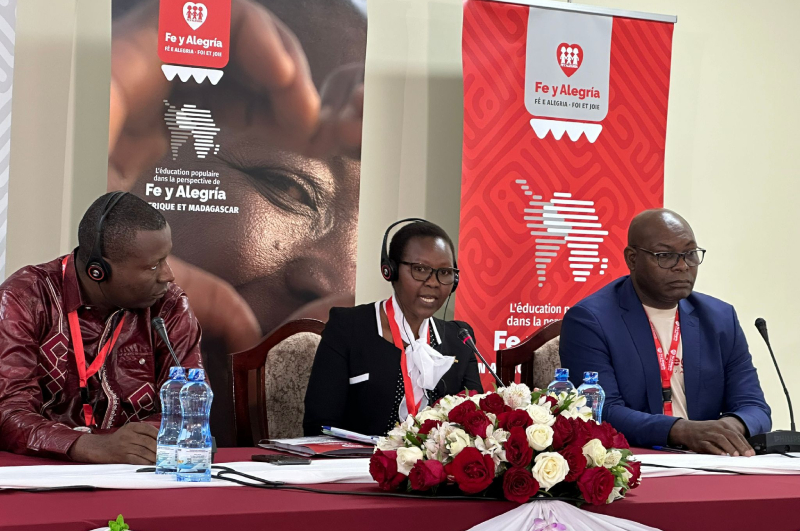
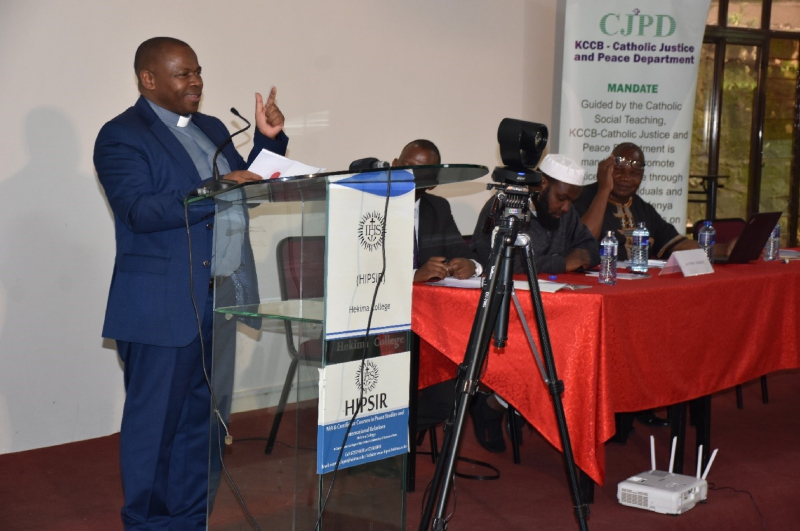
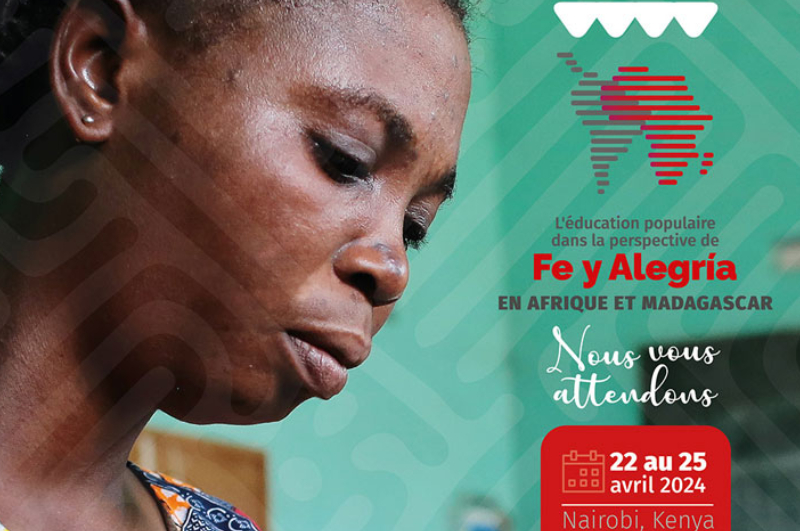
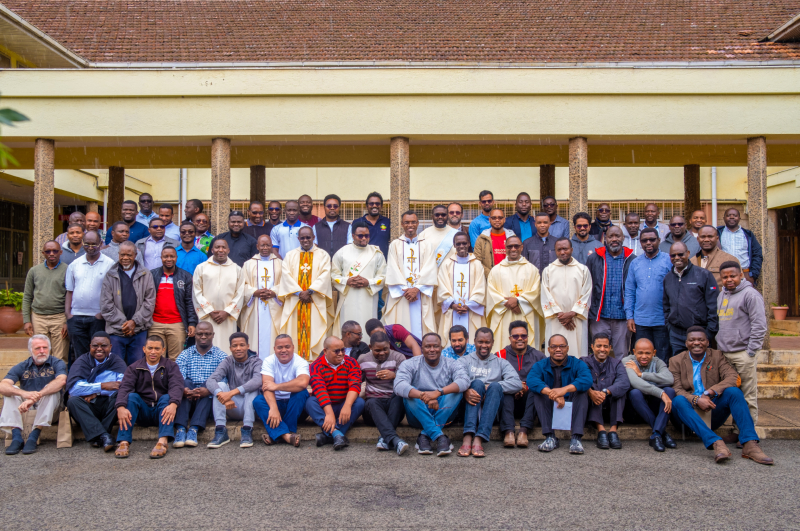
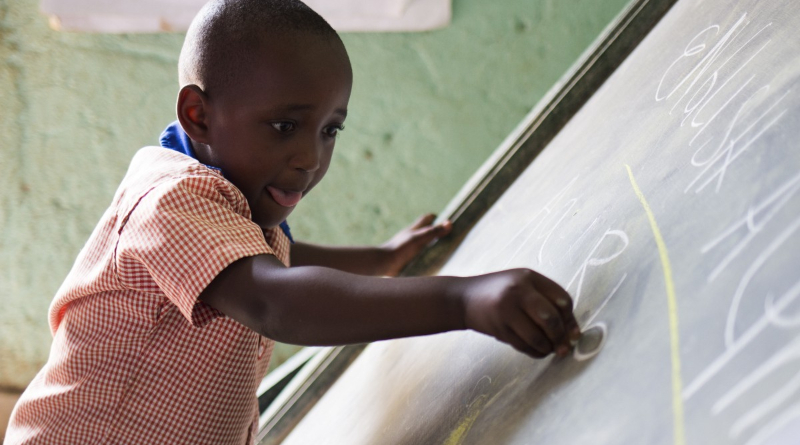
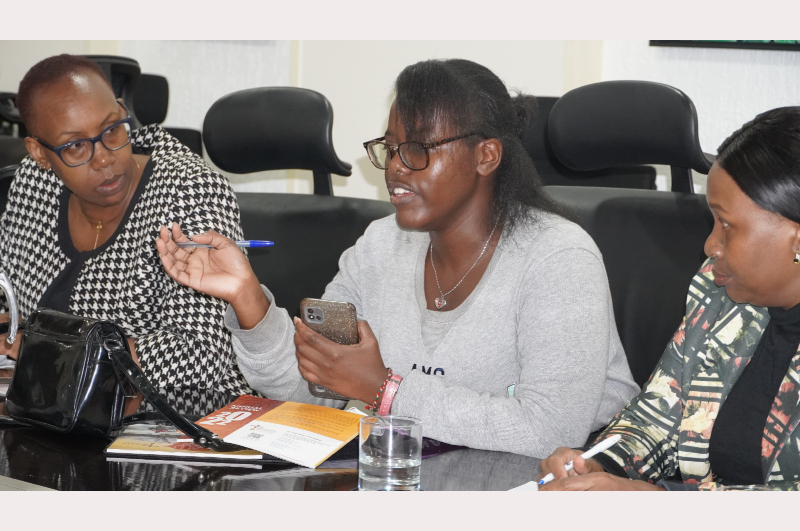
Select Payment Method
Pay by bank transfer
If you wish to make a donation by direct bank transfer please contact Fr Paul Hamill SJ treasurer@jesuits.africa. Fr Paul will get in touch with you about the best method of transfer for you and share account details with you. Donations can be one-off gifts or of any frequency; for example, you might wish to become a regular monthly donor of small amounts; that sort of reliable income can allow for very welcome forward planning in the development of the Society’s works in Africa and Madagascar.
Often it is easier to send a donation to an office within your own country and Fr Paul can advise on how that might be done. In some countries this kind of giving can also be recognised for tax relief and the necessary receipts will be issued.


